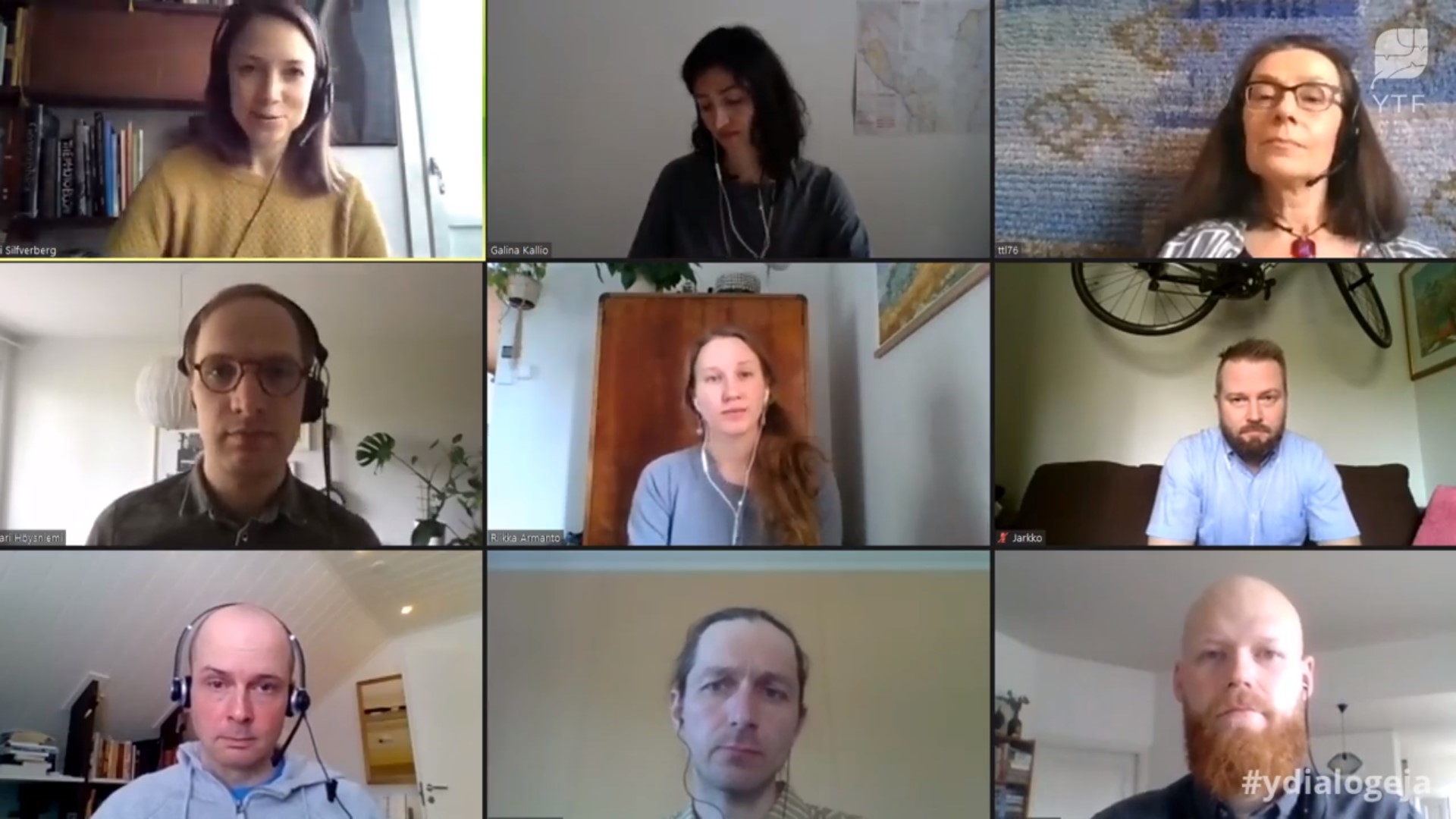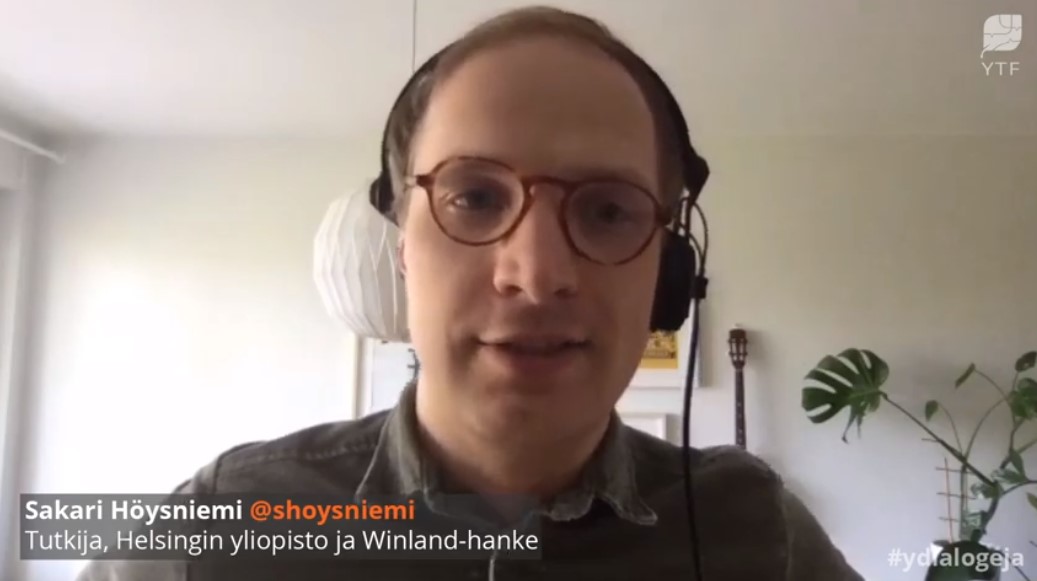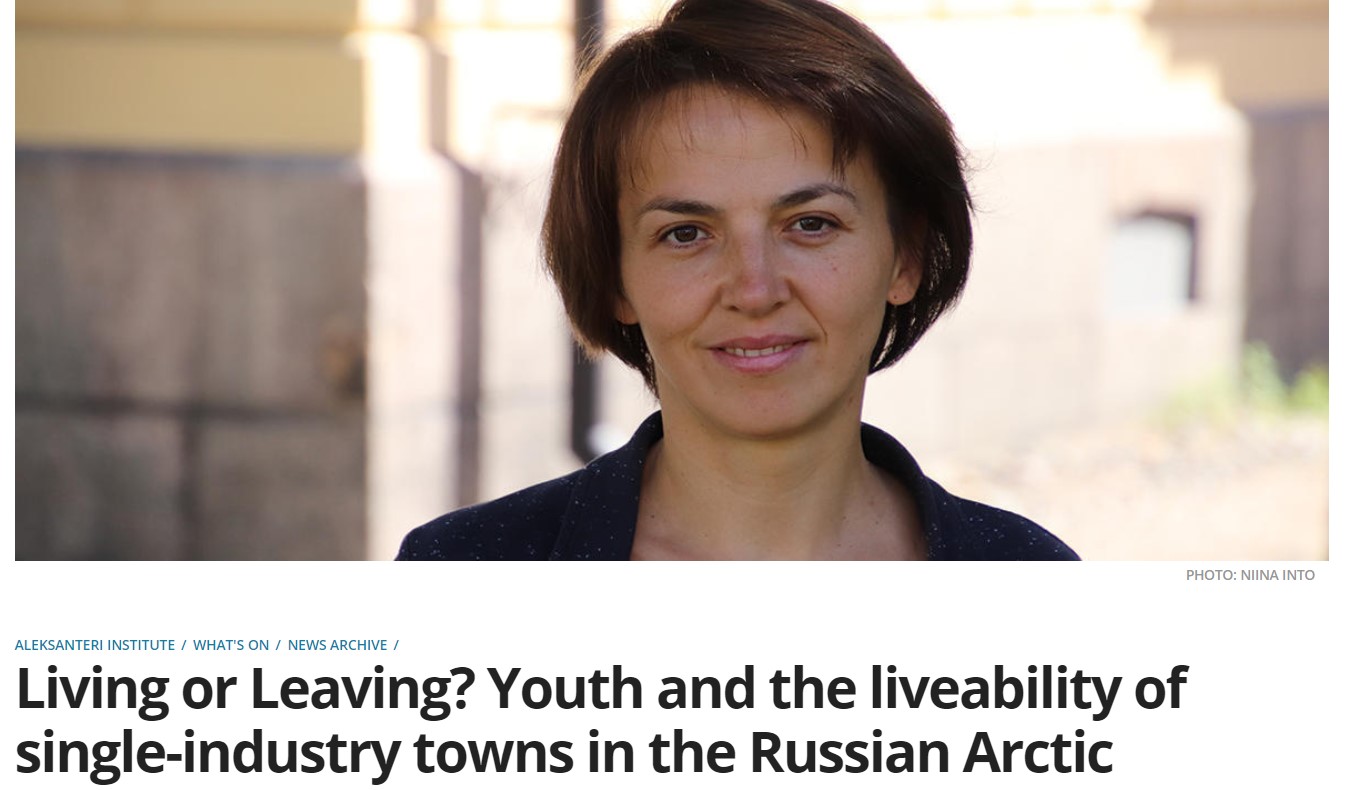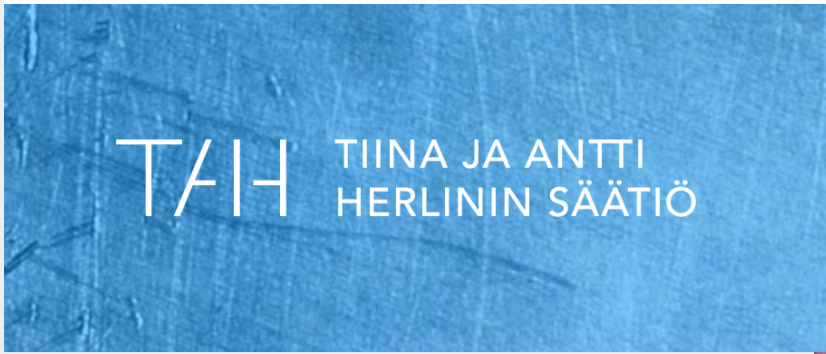On 18-21st of may the annual scientific conference “Polar readings 2020. History of science research in the Arctic and the Antarctic” took part online. It was devoted to the centenary of the Arctic and Antarctic Research Institute in St. Petersburg and to the bicentenary of the Antarctic exploration. Our project AUCAM was presented at the conference by Nikolai Bobylev with a presentation by him, Alexander Sergunin, and Veli-Pekka Tynkkynen. The slides and main theses can be found from the conference website, and Bobylev’s can be watched on Youtube.
Mistä ruoka pöytään ja energia piuhaan? YHYS Politiikkadialogi 2020
Today our Doctoral candidate Sakari Höysniemi participated in the event titled “Mistä ruoka pöytään ja energia piuhaan? YHYS Politiikkadialogi 2020” (Where do the food on the table and energy in cords come from? YHYS Policy dialogue 2020) on the 25th of May. The event was organised by the Forum for Environmental Information and was held online. Sakari participated in the second discussion of the event, where the participants talked about their perspectives on energy security and sustainable models of local economies.
More information on the event can be found from Ympäristötiedon foorumi.
A book review on Sanna Kopra’s book “China and great power responsibility for climate change” has been published this week
A book review by Sebastian Losacker on Sanna Kopra’s book “China and great power responsibility for climate change” has been published this week in Eurasian Geography and Economics.
China is playing an increasingly important role in global politics and value chains. Against this background, it is not only the country’s power that is changing, but also its responsibility. This is particularly true for international climate policy, as China is not only the largest emitter of CO2, but an influential international player. At the same time, other nations such as the USA are currently assuming less and less responsibility. However, China continues to be an emerging economy in many areas and must reconcile this global responsibility with other goals such as poverty reduction and economic catching up. In her book China and Great Power Responsibility for Climate Change, which is based on her dissertation project, Sanna Kopra discusses the understanding of great powers and climate responsibility in the context of China’s current international climate policy engagement.
Losacker, in conclusion, states that “Altogether, Kopra manages not only to deepen the theoretical understanding of great power responsibility, she also provides important empirical insights on China’s international climate policy, marking the book as an important read for academics and policy practitioners alike“. The full version of the review can be read on the journal’s webpage.
The Privatization of Rosneft: An Unintended Consequence of the Coronavirus Pandemic and the 2020 Oil Crisis
Nadezhda Stepanova, invited researcher at the Aleksanteri Institute, affiliated with our research group, co-wrote a text about the oil crisis 2020 and privatization of Rosneft as an unintended consequence of the COVID-19 pandemic. The analytical essay is part of the Politics&Pandemics special series and is published at the ElMaRB project blog.
Some day in the future, economic historians will likely consider the dramatic decline of international oil prices, which occurred in March 2020, as a turning point in the development of the global petroleum industry. This collapse puts the end to the era of expansive oil, which began after the Iraq war of 2003. That era is over now as the global economy seems to return to a period of low oil prices, similar to the one at the end of the 20th century after 1986.
There are a lot of explanations for the collapse of oil prices in the business and academic literature. Some experts think that the coronavirus pandemic undermines the global demand for petroleum, while other economists suppose that the dissolution of the coalition of OPEC countries and Russia in March 2020 was responsible for the destruction of the previous oil price equilibrium at the international oil market. However, the question of why this collapse of the oil price equilibrium happened is no longer relevant. The questions scholars should focus on now are how the decrease in oil prices will impact the economies of oil-exporting countries in the world after the pandemic? What reaction to this crisis can we expect from the governments of oil-producing countries? Finally, what will happen to the Russian economy?
The oil crisis and the escalating oil price war between Saudi Arabia and Russia of 2020 might open intellectual debate on what is the best way of the organization of the petroleum industry in the conditions of low oil prices. What model of petroleum ownership is optimal for the economy in the new age of cheap oil prices? What will the reaction of the state to this problem be? Could we expect the mass privatizations of state-owned oil companies around the world? This essay is an attempt at addressing the problem.
Living or Leaving? Youth and the liveability of single-industry towns in the Russian Arctic
Alla Bolotova, Post-doctoral researcher in the Wollie project, wrote an article for the new issue of Aleksanteri Insight. Aleksanteri Insight is a series of expert opinions, published by the Aleksanteri Institute quarterly and edited by Kaarina Aitamurto and Dmitry Yagodin. The latest issue of the series is titled “Living or Leaving? Youth and the liveability of single-industry towns in the Russian Arctic” and provides results of Alla Bolotova’s work within the Wollie project.
The article is available in both English and Finnish online.
Oil market and coronavirus
Crashing oil prices are one of the most discussed topics these days, and many try to understand why does it happen and what are the effects. To Russia, that is largely dependent on high oil prices, the current situation is especially worrisome. The solid prices are the lowest in 20 years (and on Monday American WTI oil even had a negative price of -37 US dollars), and the ruble has been dropping for more than a month now, and the coronavirus outbreak does not help the economy either. Professor Tynkkynen has been approached by several media outlets to comment on the recent developments, and here we have collected his interviews.
Firstly, Professor Tynkkynen appeared today in the Ykkösaamu programme on Yle Radio 1, the interview starts at 52:41.
Secondly, Veli-Pekka Tynkkynen’s comments can be read in today’s Kauppalehti article, titled “Kaoottinen öljymarkkina iskee rumasti” (The chaotic oil market lunges nastily). For instance, talking about Brent’s price decline, Professor Tynkkynen said
that oil will be bringing tax rubles to President Vladimir Putin’s government as long as the price remains above $ 15 a barrel. If the price falls below $ 15, the Russian economic crisis will worsen.
Thirdly, Professor Tynkkynen’s comments on Russian National Wealth Fund can be found in the MTV news. This fund accumulated extra oil and gas revenues for 12 years, now has more than 120 billion US dollars and in theory, can be used for supporting Russian citizens during these difficult times. However, as Professor Tynkkynen states
– There are significant buffer funds in Russia. It is a fact that in recent decades, public investment has not gone to the social and health sectors but to the energy sector and the construction of military equipment How Russia can take care of the well-being of its citizens is a big social question, Tynkkynen says.If Russia’s social- and healthcare cannot withstand the corona pandemic, the people may be even more angry at their government.– In recent days, there has been criticism of the Putin administration in the Russian media. Even in the media, which has been very sympathetic to the administration, there is criticism of the fact that in recent decades Russia has invested in supporting the fossil energy sector and building security and military equipment, and not in improving the social and health sectors, Tynkkynen says.
Karoliina Hurri for Through the Looking Glass
This year our Doctoral candidate Sohvi Kangasluoma together with her fellow PhD student Maija Greis started a blog “Through the Looking Glass“, where they bring to the light stories and experiences of women in Academia.
Today they published an inspiring interview with another Doctoral candidate from our research group Karoliina Hurri. Karoliina spoke about many important issues in her interview, ranging from how she got interested in her topic to what coronavirus crisis can teach us about climate change mitigation.
Read the interview in the “Through the Looking Glass” blog, and follow the project on Twitter and Instagram.
Our next interview is by PhD candidate @HurriKaroliina Go and read her thoughts about doing research, climate change and corona 🌍💙https://t.co/BMPZojBrGg pic.twitter.com/mRTtDxFR7X
— Through the Looking Glass (@AliceTheGlass) April 14, 2020
Coronavirus, Russia and declining oil prices
While all the world is affected by the coronavirus pandemic, the oil market is not an exception. The prices have been plummeting since March, when Saudi Arabia and Russia engaged in the oil price war. YLE tried to explain what is going on now with the oil market and published an article “Pandemia iski myös öljymarkkinoille: Sekoitti Venäjän ja Saudi-Arabian hintasodan kortit” (The pandemic hit also the oil market: Shuffled Russian and Saudi price war cards). Professor Veli-Pekka Tynkkynen commented on the issue for the article:
So is there a solution to the price war in the midst of the coronavirus crisis?
– Time will show it. We have seen the co-operation between Opec and Russia in recent years, says Veli-Pekka Tynkkynen, Associate Professor in Russian Environmental Studies at the Aleksanteri Institute, University of Helsinki.
He believes that Russia is at a disadvantegous position in this contention.
– If we look at the drop in the price of oil, Russia’s Urals brand has decline the most. With this price of oil, Saudi Arabia is still able to generate profits for itself, unlike Russia, where production costs are starting to be higher than the current barrel price for Urals brand.
Read this and other insights in the article online.
Karoliina Hurri got 2-year funding
Today the good news came that our PhD student Karoliina Hurri was awarded a two-year funding from Tiina and Antti Herlin Foundation. The Foundation support research aimed at solving pressing environmental issues. In January they opened a call for continuation grants for researchers who had received the funding previously, and
The goal of the application cycle is to continue to offer research data to support public debate and decisions, and the foundation seeks to find more solutions to the most alarming changes in the climate as well as creating more ways of preventing them in the future, both at the individual and society level.
Karoliina Hurri got the one-year grant in 2018 and 2019 to work on her dissertation “The Construction of China’s Leadership Role in Climate Politics”, and we are very happy that she received now two more years of funding. Congratulations, Karoliina, and keep up the great work!
E-book “Chinese Policy and Presence in the Arctic” is published
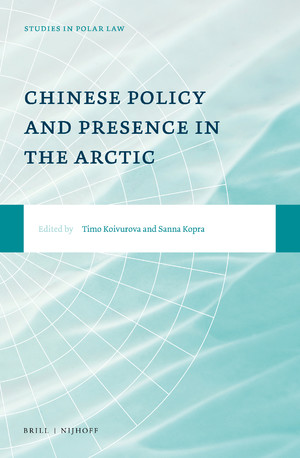 An electronic version of the book co-edited by Professor Timo Koivurova and our team member Dr. Sanna Kopra has been published. The book is titled “Chinese Policy and Presence in the Arctic” and offers a comprehensive account of China’s evolving interests, policies, and strategies in the Arctic region.
An electronic version of the book co-edited by Professor Timo Koivurova and our team member Dr. Sanna Kopra has been published. The book is titled “Chinese Policy and Presence in the Arctic” and offers a comprehensive account of China’s evolving interests, policies, and strategies in the Arctic region.
Despite its lack of geography north of the Arctic Circle, China’s presence in the High North is expected to grow in the coming years, which, in turn, is likely to speed up globalization in the region. This book brings together experts on China and the Arctic, each chapter contributing to a detailed overview of China’s diplomatic, economic, environmental, scientific and strategic presence in the Arctic and its influence on regional affairs. The book is of interest to students, scholars and those dealing with China’s foreign policy and Arctic affairs.
Apart from co-editing the volume, Sanna Kopra also co-wrote several chapters: “Introduction to China’s Arctic Engagement”, “China’s Arctic Policy”, “China’s Economic Presence in the Arctic: Realities, Expectations and Concerns”, “Conclusion: China’s Policy and Presence in the Arctic”, and “China, Climate Change and the Arctic Environment”. Our doctoral candidate, Karoliina Hurri, also participated in co-writing the latter one.
Get the e-version or order a hardback copy online.


